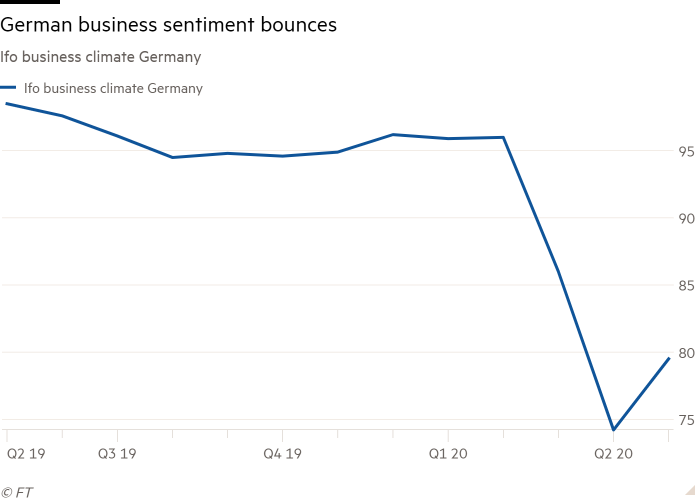
German business expectations pick up as lockdown is lifted
Monthly survey finds improving outlook despite pessimism over current effect of pandemic
by Martin ArnoldGerman businesses are becoming more confident about their outlook for the rest of this year even though their assessment of the current impact of the pandemic has worsened, according to a survey published on Monday.
The Ifo Institute in Munich said its monthly survey of about 9,000 German companies found that sentiment had “recovered somewhat after a catastrophic few months”. Its main business climate index rose to 79.5 in May — up from a record low of 74.3 in April.
“The gradual easing of the lockdown offers a glimmer of hope,” said Clemens Fuest, president of Ifo. “Nevertheless, many companies are still pessimistic about their business.”
After Germany’s lockdown was partially lifted in recent weeks, children are returning to schools, many shops and restaurants are reopening, football matches are being played and car companies have restarted production — but all with social-distancing rules still in place.
Chancellor Angela Merkel’s government aims to extend the rules requiring people to keep 1.5 metres apart and to wear face masks in certain public places until July, while allowing up to 10 people or the members of two households to meet in public areas, Bild newspaper reported on Monday.
However, officials in some regions that have had fewer coronavirus infections, such as the state of Thuringia, are pushing to ditch these rules by early June.

The German economy is expected to suffer its biggest postwar contraction this year, although it seems to be recovering faster from the pandemic than many other large European economies, reflecting a quicker lockdown exit and a lower reliance on hard-hit industries, such as tourism.
The Ifo survey found that German businesses’ assessment of their current situation had worsened, while their expectations for the next six months had improved in all sectors.
Sentiment improved most sharply among companies in Germany’s trade sector — which includes retailers. While these companies were still pessimistic, they were no longer the most gloomy because their outlook recovered faster than the country’s export-focused manufacturing sector.
“Industrial companies are still a long way from optimism,” said Mr Fuest. “Their assessment of the current situation was once again markedly worse.” But he added: “The easing of the lockdown is improving sentiment among retailers in particular.”

The outlook of companies in Germany’s domestic-focused services sector “recovered notably from its historic low in April”, said Ifo. The country’s construction companies continued to be the least worried about the outlook, even as their assessment of the current situation worsened.
New orders in the construction industry fell 10.5 per cent in March from the previous month, one of the biggest drops on record, according to data published on Monday.
“Reviving economic activity and returning optimism are highly welcome but are definitely no reason for complacency or even hubris,” said Carsten Brzeski, economist at ING. “Even in a more benign scenario, with more gradual lifting of the lockdown measures and no second wave of the virus, the German economy is unlikely to return to its pre-crisis level before 2022.”
Recommended
FT Globetrotter
Frankfurt walks: Sachsenhausen springs back to life
Ifo expects a double-digit decline in the German economy in the second quarter and the government has forecast that gross domestic product will fall 6.3 per cent this year — a record postwar recession.
Germany’s statistics office on Monday confirmed that GDP fell 2.2 per cent in the first quarter from the preceding three months, compared with 5.8 per cent for France and 3.8 per cent for the overall eurozone. Output in Europe’s largest economy was supported by resilient government spending and construction activity, offsetting drops in exports, household spending and machinery investment.
“Government support will remain key as restrictions are lifted and the economy starts to recover, with a new stimulus package expected to be agreed on June 2,” said economists at Morgan Stanley.
The Ifo survey confirmed the rebound in German business activity reported last week by the IHS Markit purchasing managers’ index, which recovered from record lows in both the country’s services and manufacturing sectors while remaining well below long-run averages.